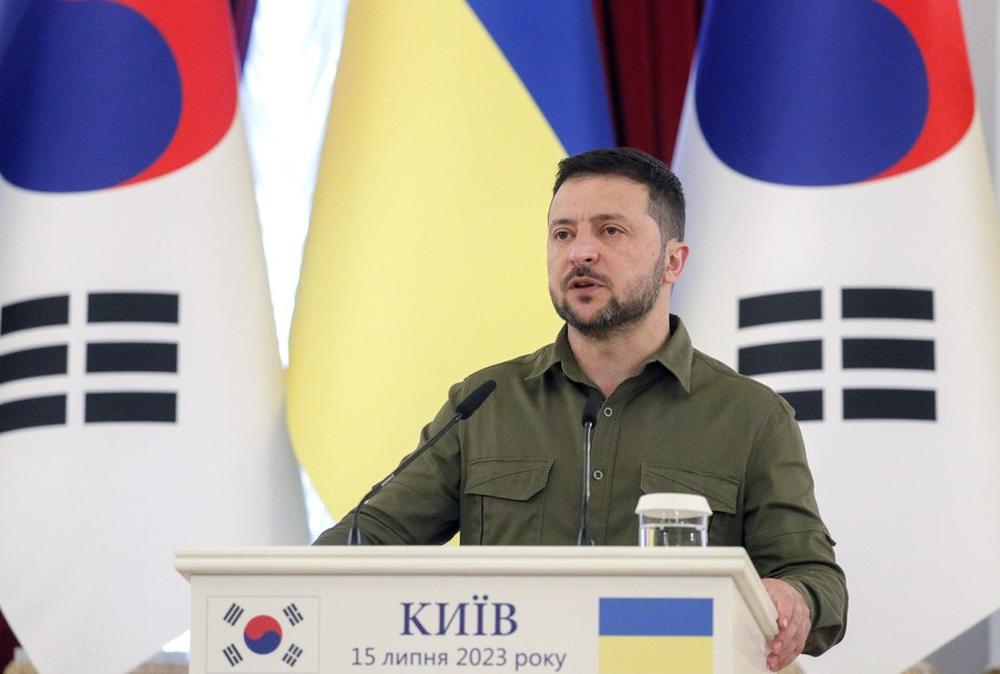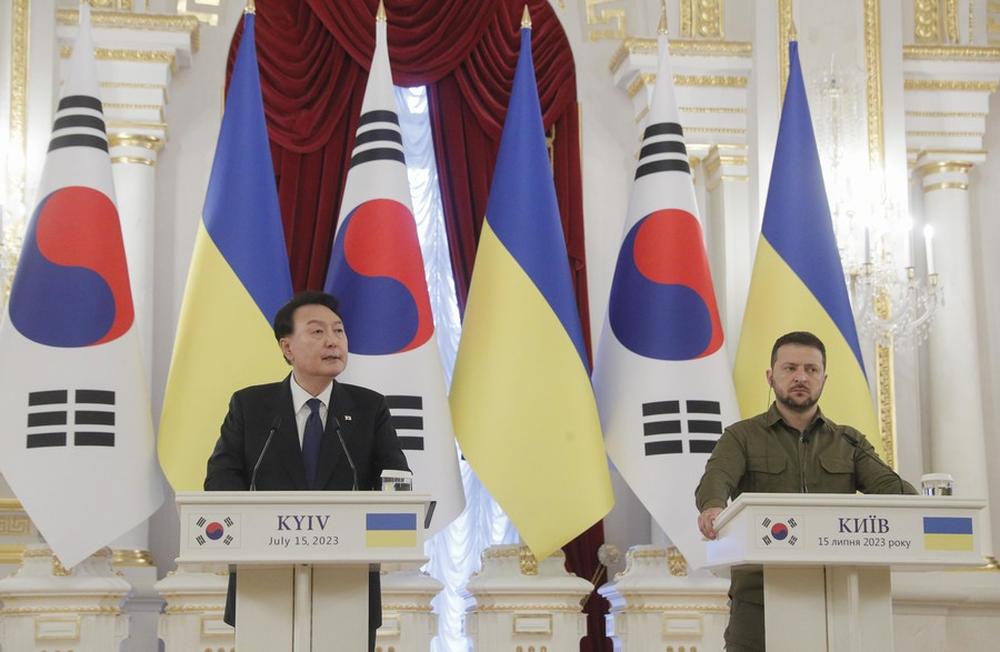- #Economy & Trade
- #Europe
- #Global Issues
- #Multilateral Relations

▶ Yoon Suk-yeol’s visit to Kyiv confirmed South Korea’s commitment to the coalition of democratic states supporting Ukraine in its defence war against Russia.
▶ In addition to its political dimension, Yoon’s visit prepared the groundwork for South Korea’s economic engagement in post-war Ukraine.
▶ Although the Republic of Korea is trying to reinforce its status as a “global pivotal state”, it remains reluctant to provide Kyiv with lethal weapons, the most efficient way to back the country’s efforts to ensure its freedom, peace, and future prosperity.
▶ Becoming a “global pivotal state” would take time and a coherent, consistent effort by successive South Korean governments.
Deciding to visit Kyiv, President Yoon Suk-yeol wanted to strengthen the Republic of Korea’s credibility as a “global pivotal state” and support South Korean companies in entering reconstruction projects in post-war Ukraine. Accomplishing both objectives will face challenges.
Political Support
Yoon Suk-yeol’s visit to Kyiv confirmed South Korea’s commitment to the coalition of democratic states supporting Ukraine in its defence war against Russia. Visiting the capital of an invaded country became a political gesture of belonging to the camp of states opposing the violation of the most elementary components of the rules-based international order, such as sovereignty, independence and territorial integrity. After all G7 leaders visited Kyiv, the South Korean president came under increasing pressure also to appear there. Yoon’s participation in the NATO summit in Vilnius and his official visit to Poland were conducive to arranging a trip to Ukraine.
Showing solidarity with Ukraine, Yoon craved to highlight his administration’s vision to make South Korea a “global pivotal state”, contributing to freedom, peace and prosperity based on its liberal democratic values and cooperation with like-minded partners. Visiting a war-torn country, Yoon has made a political gesture to increase South Korea’s role as a more active player in global affairs beyond the Korean Peninsula. An expression of Yoon’s commitment to “values diplomacy” was his words after he met with Ukraine’s president Volodymyr Zelenskyy when he said, “The Republic of Korea will be a partner in Ukraine’s construction of freedom, peace and prosperity, and furthermore be a reliable partner contributing jointly with Ukraine to freedom, peace and prosperity in the world.” To strengthen his message, Yoon pledged to provide Ukraine with $150 million in humanitarian aid this year, following $100 million in 2022. He also supported Zelenskyy’s 10-point peace formula, which contains the withdrawal of Russian troops from Ukrainian territory within its internationally recognised borders, Russia’s compensations for its crimes and the damages caused to Ukraine and post-war security guarantees for Ukraine.
Economic Interests
In addition to its political dimension, Yoon’s visit prepared the groundwork for South Korea’s economic engagement in post-war Ukraine. The Yoon administration is strengthening ties with Ukraine to facilitate South Korean companies’ entry into Ukraine’s post-war reconstruction projects, estimated to be worth up to $1.58 trillion. The Republic of Korea evaluates that its public and private companies could participate in projects worth as much as $52 billion. South Korea’s involvement could cover many sectors, such as construction, airport and railway infrastructure, nuclear and hydroelectric energy, and information technology. Besides the economic benefits, support for the reconstruction of Ukraine would enhance South Korea’s credibility as a responsible member of the international community. Therefore, it is in the interest of the South Korean government and businesses to be involved in rebuilding Ukraine.
In August, the Yoon government issued special permits for business representatives to visit a war-torn country to explore Ukraine’s needs and prepare the groundwork for participation in future projects. At the government level, delegations from the Ministry of Land, Infrastructure and Transport and the Ministry of Trade, Industry and Energy are scheduled to visit Ukraine in August and October. The Yoon administration also intends to cooperate with foreign partners in supporting the reconstruction of Ukraine. South Korea regards Poland as a partner who, due to its geographical proximity, knowledge of the market and close political and people-to-people contacts, can play a crucial role in rebuilding Ukraine. That is why South Korea has established comprehensive cooperation with Poland in this area. Seoul also intends to cooperate with international institutions in rebuilding Ukraine, such as the European Bank for Reconstruction and Development and the World Bank.
Reluctance to Provide Arms
Although the Republic of Korea is trying to reinforce its status as a “global pivotal state”, it remains reluctant to provide Kyiv with lethal weapons, the most efficient way to back the country’s efforts to ensure its freedom, peace, and future prosperity. For example, South Korea is a major producer of artillery ammunition, so it could massively assist Ukraine in this field. During his meeting with Zelenskyy, Yoon pledged to support Ukraine this year with additional supplies of body armour, helmets, and mine detectors but did not mention any arms deliveries. A spokesman of the South Korean Ministry of Defence assured that South Korea would continue to supply only non-lethal assistance to Ukraine.
The Republic of Korea fears that providing arms to Ukraine would further deteriorate Seoul’s relations with Moscow. Economic concerns stem from the fact that South Korea has increased its share of coal imports from Russia since its war against Ukraine began. The decision to militarily support Ukraine could also spell trouble for South Korean businesses in Russia. In contrast to many American and European companies cutting ties with Russia, more than 150 South Korean firms have maintained their operations in Russia. Seoul’s support of Ukraine also raises the risk of accelerating Russia’s cooperation with North Korea, including in the military domain, increasing the risk of further tensions on the Korean Peninsula.
Challenges Ahead
South Korea’s restraint on arms supplies to Ukraine shows that the Yoon administration’s policy of promoting freedom, peace and prosperity has limits. Seoul’s stance on military aid is politically disappointing, considering Yoon’s words in April indicated the possibility of arming Ukraine. Reports suggesting that North Korea has supplied arms to Russia could prompt South Korea to reconsider its position on providing lethal military assistance to Ukraine. Furthermore, Russia’s circumvention of sanctions imposed on North Korea and the Kremlin’s de facto acceptance of the North Korean nuclear weapons calls into questions Russia’s value as South Korea’s partner in ensuring security on the Korean Peninsula.
Seoul’s reluctance to arm Kyiv also does not serve well South Korea’s economic plans to reconstruct post-war Ukraine. The success of development projects in Ukraine will require a sustained improvement in the security situation, which can be ensured by supplying armaments to the invaded state. Ending hostilities and preventing further Russian attacks in the future would also favour the stable functioning of South Korean investments in Central European countries – including those bordering Ukraine, such as Poland, Slovakia and Hungary – which in recent years have become more attractive and prospective trade and investment partners of the Republic of Korea than Russia.
The Yoon administration should make both the business community and the public aware of the economic-security interdependence regarding Seoul’s engagement in Ukraine. It will be challenging as Yoon’s visit to Kyiv was not received well by the political opposition in South Korea. Opposition politicians and media criticised the president not only for the risk of worsening relations with Russia. They also pointed out that “values diplomacy” amounts to an overly close rapprochement with the United States and the West, which could jeopardise South Korea’s national interests, especially in its relations with China.
Becoming a “global pivotal state” would take time and a coherent, consistent effort by successive South Korean governments. The example of the approach to Ukraine shows that cross-party consensus in the Republic of Korea on its foreign policy is difficult to reach. Therefore, South Korea’s deepening political divide will be a significant challenge, hindering the vision of a “global pivotal state”.
Oskar Pietrewicz is Senior Analyst of the Asia-Pacific Programme at the Polish Institute of International Affairs (PISM). He holds a PhD in social sciences in the field of political science from the University of Warsaw. His research focuses on security issues in Northeast Asia, North and South Korea’s foreign and security policy, U.S. and China’s policy toward the Korean Peninsula. He has participated in track 1.5 and 2 dialogues with North and South Korea. He also advises the Polish public institutions on Korea-related issues.
